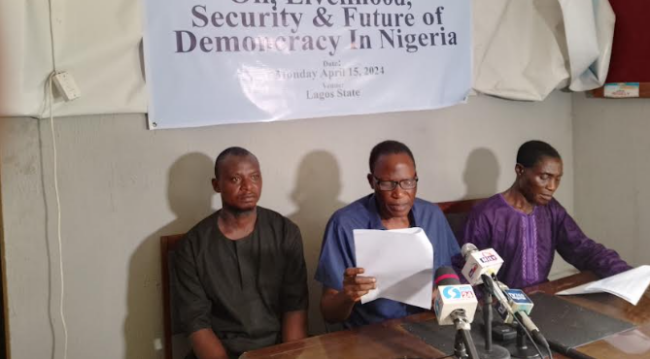A group under the aegis of Nigerian Coalition of Civil Society Groups (NCCSG), on Monday, called on President Bola Ahmed Tinubu, to intervene and direct the Nigerian National Petroleum Company Limited (NNPCL) to stop the award of surveillance contracts to companies led by individuals with questionable characters.
The coalition made the call at a press conference that took place in Maryland, Lagos, noting that recent developments, and in particular the shocking attack in Okuoma village, resulting in the tragic killing of 17 soldiers, highlighted a disturbing trend.
NCCSG, while expressing concern about the future of oil, livelihood, and humanity in Nigeria and what the country would look like in the next 15 or 20 years, however, lauded President Tinubu for his recent efforts in curbing oil theft and the Nigerian Navy for its remarkable efforts in same line, but insisted that entrusting pipeline security to those with militant backgrounds undermined the country’s sovereignty and international reputation, particularly within the Organisation of Petroleum Exporting Countries (OPEC).
Address newsmen on the subject matter: “Insecurity, Insecurity, Environmental Threat and Oil Production in Nigeria: The Time for Sanity is Now,” Niger-Delta Coordinator of the coalition, Comrade Taiwo Adeleye, who spoke alongside Comrade Fred Ojinika and Comrade Kole Ajayi, queried the interest the NNPCL top management might have in these entities and propensity to assign national asset protection to known militants.
“Recent developments highlight a disturbing trend: surveillance contracts are being awarded to individuals and entities with a history of militant activity against the Nigerian state.
“Such decisions not only compromise national security but also risk empowering these groups to further arm themselves, thereby perpetuating violence and instability in a region already beset by challenges.
“The shocking attack in Okuoma village, resulting in the tragic loss of 17 soldiers, served as a stark reminder of the consequences of arming those with history of violence, one of which is the proliferation of arms and the fact that many non-state actors are still in possession of illicit weapons. It means the killing of soldiers and civilians in the oil-producing areas may continue.
“By continuing this practice, the Nigerian state appears to be yielding to the demands of militants, rather than upholding the rule of law and ensuring the safety of its citizens. This capitulation threatens to erode public confidence and the authority of the state,” Adeleye said.
“Arms proliferation in Nigeria is a threat to regional stability. Armed groups taking the role of pipeline contractors is a time bomb. It would push Nigeria to the brink with the passage of time. What we see today undermines international laws and conventions of the United Nations (UN).
“The Arms Trade Treaty is the first legally-binding instrument ever negotiated in the United Nations to establish common standards for the international transfer of conventional weapons. The proliferation of arms is against International Laws and convention which Nigeria is a signatory,” he warned.
Comrade Adeleye, therefore, called on President Tinubu to review and revoke pipeline contracts currently held by people associated with violence and terrorism in the past, saying that he should equally investigate the proliferation of arms in the Niger Delta, including the role played by armed militants in the importation of illegal weapons being the major issue that must be addressed if Nigeria was to be taken seriously by the international community.
According to him, this must be done based on recent listing of Nigeria by the UN as home to 75percent of of 500million illegal weapons, and a dangerous spell for that matter, saying that professional groups can instead be given the role of oil pipeline protection but not leaders of Armed groups.
Besides, he charged the president to ensure that Nigerian military and pipeline protection companies operate with the utmost professionalism and are not complicit in arms trafficking contracts.
Adeleye, however, assured that the body he represented would continue to stand firm as a watchdog of the society, vowing “not to relent until these critical issues are addressed”.
“It is time for the Nigerian government to take decisive action to safeguard the nation’s assets, restore confidence in its security apparatus, and maintain its standing in the international community,” he concluded.
